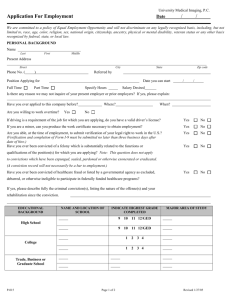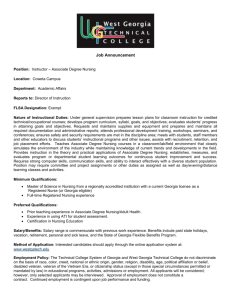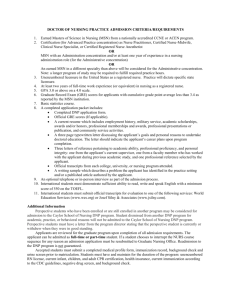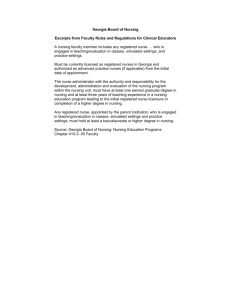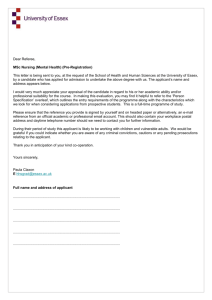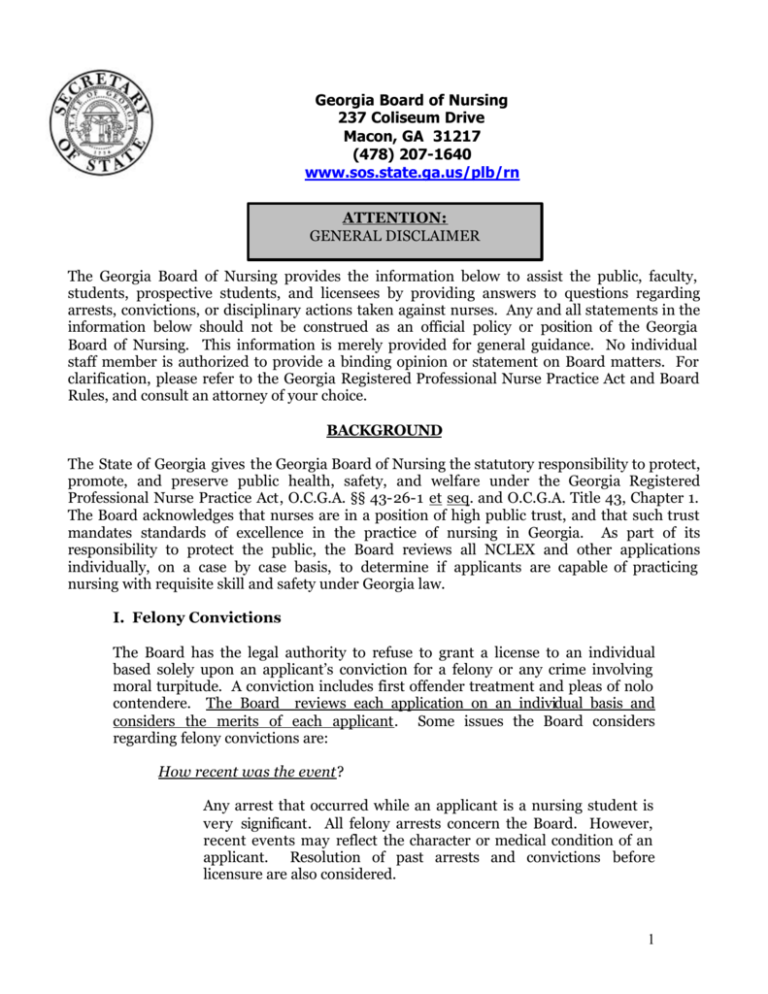
Georgia Board of Nursing
237 Coliseum Drive
Macon, GA 31217
(478) 207-1640
www.sos.state.ga.us/plb/rn
ATTENTION:
GENERAL DISCLAIMER
The Georgia Board of Nursing provides the information below to assist the public, faculty,
students, prospective students, and licensees by providing answers to questions regarding
arrests, convictions, or disciplinary actions taken against nurses. Any and all statements in the
information below should not be construed as an official policy or position of the Georgia
Board of Nursing. This information is merely provided for general guidance. No individual
staff member is authorized to provide a binding opinion or statement on Board matters. For
clarification, please refer to the Georgia Registered Professional Nurse Practice Act and Board
Rules, and consult an attorney of your choice.
BACKGROUND
The State of Georgia gives the Georgia Board of Nursing the statutory responsibility to protect,
promote, and preserve public health, safety, and welfare under the Georgia Registered
Professional Nurse Practice Act, O.C.G.A. §§ 43-26-1 et seq. and O.C.G.A. Title 43, Chapter 1.
The Board acknowledges that nurses are in a position of high public trust, and that such trust
mandates standards of excellence in the practice of nursing in Georgia. As part of its
responsibility to protect the public, the Board reviews all NCLEX and other applications
individually, on a case by case basis, to determine if applicants are capable of practicing
nursing with requisite skill and safety under Georgia law.
I. Felony Convictions
The Board has the legal authority to refuse to grant a license to an individual
based solely upon an applicant’s conviction for a felony or any crime involving
moral turpitude. A conviction includes first offender treatment and pleas of nolo
contendere. The Board reviews each application on an individual basis and
considers the merits of each applicant. Some issues the Board considers
regarding felony convictions are:
How recent was the event?
Any arrest that occurred while an applicant is a nursing student is
very significant. All felony arrests concern the Board. However,
recent events may reflect the character or medical condition of an
applicant. Resolution of past arrests and convictions before
licensure are also considered.
1
Was violence involved?
In cases involving violent crimes such as battery, assault, or
robbery, the Board considers the chance of future harm being done
to patients and the public. Evidence of poor impulse control or the
inability to control anger is of great concern to the Board.
Are boundary violations involved?
Any conviction related to sexual misconduct is of great concern,
including any form of sexual exploitation or predatory behavior.
Boundary violations include any arrest or conviction involving
circumstances in which the applicant placed his or her own needs
above those of another person by crossing personal or professional
boundaries. Such violations may
include fraud and forgery
convictions. These convictions raise the question of whether the
individual has been rehabilitated and has restored personal
integrity and honesty.
What was the severity of the crime?
Any felony conviction is a legal basis to deny licensure or to
discipline a licensee. The Board considers circumstances involving
an arrest or conviction, such as the age of the applicant at the time
of the offense and the completion of any sanction, including
probation, imposed by a court. The applicant who is a convicted
felon has the burden of proving to the Board’s satisfaction that he or
she is fit to practice nursing and meets the qualifications and
standards required for licensure, considering past acts of violence,
aggression, deceit, dishonesty, or other conduct harmful to the
public.
Was the conviction related to controlled substances?
Any arrest involving a violation of the Georgia Controlled
Substances Act is reportable to the Board. Under O.C.G.A. § 16-13111, a first time felony conviction of a licensed person involving
controlled substances or marijuana results in a mandatory three (3)
month suspension of the license. A second felony conviction
results in license revocation. In addition, an arrest on such a charge
raises the issue of substance abuse or impairment. Based on arrest
or conviction for drug violations, the Board has the authority to
require individuals to submit treatment records or have a
comprehensive mental and physical evaluation performed by a
qualified
physician.
This
evaluation
would
include
recommendations for treatment and a statement about whether the
individual could practice nursing with reasonable skill and safety.
2
II.
Crimes Involving Moral Turpitude
The Nurse’s Legal Handbook Fourth Edition, 2000 defines moral turpitude as “
the act of baseness, vileness or the depravity in private and social duties which
man owes to his fellow man, or to society in general…. ” This legal term has been
used to describe crimes that significantly violate an accepted moral standard.
The applicant may not be able to determine if the conviction fits this definition.
Any arrest or conviction should be acknowledged on the application
or license renewal form without regard to the nature of the crime.
III.
DUI or DWI: Driving Under the Influence/ Driving While
Intoxicated or
Impaired.
Any offense that impacts the fitness for nursing practice is of concern to the
Board. An arrest on the charge of Driving Under the Influence or Driving While
Intoxicated indicates that the applicant or licensee may have a substance abuse
problem and, as a result, may be unable to practice nursing with reasonable skill
and safety. A DUI offense is of great concern if it occurs during the time the
applicant is enrolled as a nursing student or within twelve months prior to
enrollment.
The State of Georgia has strict mandatory sentencing guidelines for DUI
convictions under O.C.G.A. § 40-5-63. If an applicant for licensure by
examination is on probation imposed by a court, the Board has the discretion to
require sanctions based on the DUI conviction and probation when granting a
license. If the court requires an alcohol or drug evaluation, the Board may
request such evaluation results be sent to the Board and may also require proof of
successful completion of criminal probation.
Repeat DUI offenses may cause the Board to suspect impairment or addiction. In
such cases, the Board has the discretion to request the applicant or licensee to
undergo a mental/physical evaluation to determine if the applicant has a
substance disorder. The Board considers treatment recommendations made by
the physician evaluator. If treatment is needed for the nurse to practice safely,
the Board may offer the nurse a Consent Agreement that provides for licensure
with a restricted license and probation for a fixed period of time.
IV.
Violation of the Controlled Substance Act/ Substance Related
Disorders
The Board reviews any arrest related to a violation of the Georgia Controlled
Substances Act with great concern. For example, an arrest for possession for
marijuana or cocaine may cause the Board to suspect a substance abuse disorder
and possible impairment of the ability to practice nursing with reasonable skill
and safety. In such cases, the Board is authorized by law to order the applicant or
3
licensee to submit to a mental/physical evaluation. The diagnosis of a substance
related disorder could result in the Board denying licensure or in offering an
applicant a Consent Order with a restricted license and probation. Such a
diagnosis may also be the basis for license suspension or revocation. Felony
convictions involving controlled substances and marijuana result in mandatory
suspension or revocation of an individual’s license under O.C.G.A. § 16-13-111, as
mentioned above. In all cases, the Board reviews the ability of the applicant to
practice nursing safely.
The Georgia Board of Nursing has a long and extensive history of promoting
programs for nurses in recovery. The primary responsibility of the Board is to
protect the public, but the Board is also committed to promoting the welfare of
nurses. There are multiple resources to assist faculty and students in obtaining
treatment for substance abuse in Georgia. The Board of Nursing supports all
programs for nurses in recovery, including the Georgia Nurse Advocate Program,
supported by the Georgia Nurses Association (GNA).
The Nurse Advocate Program has support groups and Nurse Advocates in most
regions of this state. The main number for GNA is 404-325-5536, ext. 100 or 1800-324-0462.
The current Nurse Practice
www.sos.state.ga.us/plb/rn
Act,
law,
and
rules
can
be
found
at
4

